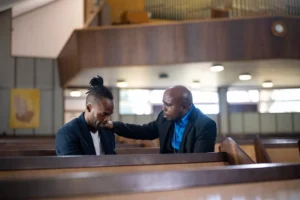Two sharp raps at the door.
“Come in.”
It was Julie. I had never known her to knock before. Only rarely had I known her to walk before. She entered my office, tossed her backpack in a chair, and sat down in the other one. Only then did she turn toward me, face full of reproach.
“Good morning,” I said.
She nodded. Even more unlike her.
“I thought you were a Christian,” she said.
I raised an eyebrow.
“I said, ‘I thought you were a Christian.'”
This time I answered, “I thought so, too.”
“Then why did you give me such awful advice?”
“What awful advice did I give you?”
“When we talked before, I’d been asking God to guide me about some post-college things, and I wasn’t hearing anything. You told me I was listening wrong.”
I smiled. “I said you’d been listening for the wrong things.”
“Same thing. I’d been waiting for voices and feelings and stuff. You said I was really depending on my feelings instead of God.”
“That’s right.”
“You said that was wrong. You said that I should ‘let my mind rest in God.’ That I should ‘think in His presence.’ That I should aim ‘not for a certain kind of experience in the mind, but a certain kind of mind.’ See, I wrote notes.”
I glanced over. She really had.
“Well, now I’m not getting anything.”
“What do you mean, ‘Not getting anything’?”
“I let my mind rest in God. I thought in His presence. I asked for the right kind of mind. And now I can’t think of anything.”
That was interesting.
“And that’s not all,” she said. “I tried going back to the feelings and stuff, but now it doesn’t work. I don’t even get them about ordinary things like I did before.”
“Sounds like you’re making progress.”
“What?”
“Don’t you think so? Your old crutch has been taken away. Now you have to walk by faith. For real this time.”
“You think this is good?”
“A good start. Sure.”
“But I’m not walking by faith. I’m not walking at all. I’m not getting my old special feelings, and I don’t have anything to take their place.”
“Back up,” I said. “Explain something you said a few sentences ago.”
“Explain what?”
“You said ‘and now I can’t think of anything.’
“So?”
“Obviously you have thoughts.”
“I don’t.”
“You thought of coming here to bawl me out, didn’t you?”
“I don’t mean things like that. You said that if I ‘thought in God’s presence’ He would give me the right thoughts about my questions. And I’m not getting any thoughts about them.”
“Julie, I said nothing of the kind.”
“You didn’t?”
“No. You asked me whether God would just ‘drop some thoughts into’ your mind, and I said no. You’d still be expecting Him to do everything; He supplies the grace, but He wants you to cooperate.”
“I don’t get it.”
“See here. What if you had no pencil, and I offered you this one?”
“I’d take it.”
“What would that require?”
“Nothing. You’re giving it to me.”
“Yes, it’s a free gift, but you’re not answering the question. What would you have to do to receive the benefit?”
“Um, let you give me the pencil?”
“That’s better, but what would that require? For example, what would your muscles have to do?”
She thought for a moment. “I’d have to hold out my arm. I’d have to open my fingers. I’d have to hold them open. I’d have to grasp the pencil, because otherwise I’d drop it. And, well, I guess I’d have to use it. Otherwise it wouldn’t do me any good.”
“OK. This time it’s God, and He’s offering to illuminate your deliberations. Now what do you have to do to get the benefit of the gift?”
“But I did that already.”
“Let Him illuminate them?”
I wagged my head. “You’re still not answering. Think of the pencil.”
“Oh, wait. I see it. I’d have to — I’d have to — well, first, I’d have to be deliberating. Or there’d be nothing to illuminate.”
“Good. And?”
She thought for a moment, opened her mouth, shut it, and thought for a few seconds more. Just when I thought she had nothing more to say, she exclaimed, “Hold out my mind, like I hold out my hand. Open it to Him. Grasp hold of — well, I don’t know what of. Of insight. And then use it.”
I smiled.
“But, Prof —”
I raised my eyebrow again.
“That’s sort of what I did do,” she said. “Not so well, now that I think of it. But I was trying. And I didn’t get any insight.”
“Didn’t you?”
“Don’t you believe me?”
“What did you think about?”
“I thought of the pros and cons of the options in front of me. I thought of my gifts. I thought about serving God. Stuff like that.”
“Well?”
“But that doesn’t seem like listening to God.”
I laughed. “It’s all in how you think about them. What else did you think about?”
“I thought, ‘This is making me tired. I’m not used to this.'”
“No doubt true. Shows you need practice.”
“And I thought, ‘This is ridiculous. I’m not getting anywhere.”
“That’s because you’re not used to the effort. What else?”
“Then something really dumb.”
“Dumb, like unintelligent?”
“Dumb, like irrelevant.”
“You mean you had irrelevant thoughts? Like getting a pizza, or eating some cookies?”
“No. Well, yes, I did think about cookies. But that’s not what I mean. I mean I kept getting off the track. Instead of thinking, I thought how I’m not any better at praying than at thinking, and I thought, ‘I ought to pray more.'”
“You’re telling me that’s not an insight?”
“Yes, it’s an insight, but —”
“But what?”
“But its’s not an insight into the post-college things I was thinking about.”
“Julie, think back. When I asked what you have to do to receive the gift when God is willing to shed light on your deliberations, how did you answer?”
“That I’d have to be deliberating.”
“Of course. Besides that.”
“I think I said, ‘Hold out my mind, like I hold out my hand. Open it to Him.’ Something like that.”
“What if you were very weak, and your muscles weren’t used to the motions required for holding out your hand and opening it?”
“I’d have to exercise them.”
“Now what if your spiritual muscles weren’t used to the spiritual motions required for holding out your mind and opening it to Christ?”
She paused. “I guess I’d have to exercise them, too.”
“Is it likely that you’d get far if you didn’t?”
“No. But how do I exercise my spiritual muscles?”
“Worship.”
“I do that.”
“Obedience.”
“I try to live by His commands.”
“Prayer.”
Long pause. “I don’t pray much.”
“Maybe that thought about praying more wasn’t so irrelevant after all.”
“Are you saying that I’m probably not going to get much guidance in my thinking unless I’m more disciplined about prayer?”
“Looks like it.”
“But that might take a long, long time!”
I laughed. “Did you think the Holy Spirit was a fast food restaurant?”
She let out a gush of breath. “Can you suggest some resources?”
“What do you mean, ‘resources’?”
“Something to read.”
“To help you pray, or to help you put off praying by doing something else?”
That startled her. “I guess I meant to help put it off.”
“Then how about some reading that is praying?”
“What do you mean?”
“We’re in Lent, so why don’t you pray the Passion narrative?”
“The what?”
“The biblical story of Christ’s suffering and death. Zero in on, say, John 18 and 19. Go through just a little bit each day. Time it so that by Easter, you’re ready for the Resurrection story in John 20.”
“Oh, I’ve read those things before. And I read lots faster than that. Besides, what’s that got to do with praying?”
“I said pray John 18 and 19. Pray the words themselves. The first day you might pray the first few verses of chapter 18, and so on. Take your time. Linger over the verses. Let them dwell in your mind. Rest in them. Rest in God. Offer the verses to Him. Pray them. Let Him pray them in you.”
“That’s a kind of prayer?”
“A very ancient one, used by both Catholics and Protestants. It’s called Lectio Divina, ‘divine reading.'”
“And you think this will show me what God wants me to do after college?”
“You’re in such a hurry!”
“Now you’re not answering my question,” she said.
“No, it won’t show you what God wants you to do after college.”
“Then —”
“But I think it may allow the Holy Spirit to strengthen your spiritual muscles so you can ‘think in His presence’ about things like that.”
She stared at me for a long time.
“Well, I’ll try it,” she said at last, “and I’ll let you know what happens.”
“Good.”
“I can’t help but wonder, though.”
“Wonder what?”
“Whether this is just your way of getting rid of me ’til Easter.”
Copyright 2006 J. Budziszewski. All rights reserved.










